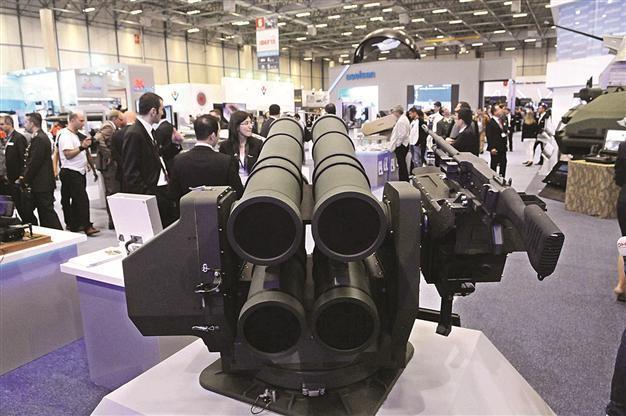Turkey seeking to woo Ukrainian defense experts amid Russia crisis
Burak Bekdil

DHA Photo
Turkey shocked its NATO allies on Sept. 13, 2013, when it announced that it selected a Chinese company to build its first long-range air and anti-missile defense system. That deal, worth $3.44 billion if Turkey insists on opting for a Chinese solution, remains a mystery, but Turkey is looking at other non-NATO suppliers of weapons systems.Last month, Ankara hosted a Ukrainian delegation under the umbrella of Ukroboronprom, a state-owned defense conglomerate bringing together 130 companies and engineering institutions. During the visit, Turkish and Ukrainian officials discussed ways to enhance defense industry cooperation between the two Black Sea neighbors.
After talks they agreed to sign a memorandum of understanding, the first legal text to pave the way for future joint projects involving arms systems.
Turks think that Ukraine could be an ideal partner to assist Turkey’s indigenous programs, thanks to its established defense industry with impressive capabilities. The most likely areas for cooperation will be missile defense, armor technologies, tank production, space, engines, satellites and fighter jets.
Ankara has its own ambitions to design, develop and manufacture indigenous fighter and tank engines, as well as a program to build its own fighter jet. It also runs a number of missile programs, both tactical and cruise.
Turks hope Ukraine will generously share its defense technology in supporting and/or partnering with Turkish programs.
Joint programs could also include the development of aircraft and tank engines, tank armor and aerospace. Most strategically, Turkish defense procurement officials are looking at an Ukrainian aircraft body to make it the primary model for their own fighter jet program.
Turkish officials say any potential deal with Ukraine will involve know-how and technology transfer, with production in Turkey, not at any Ukrainian plant.
In the event of an agreement, for instance, Turkey will seek to buy production licenses for a Ukrainian aircraft body and make it its first indigenous fighter jet, with serial production taking place at Tusas Turkish Aerospace Industries.
Similarly, any deal on missile technology will involve production in Turkey by Roketsan, the state-controlled missile maker, and military electronics specialist Aselsan, Turkey’s biggest defense firm.
More recently, the Russians came into the picture.
Officials from Rosoboronexport, the sole state agency for Russia’s export and import of defense-related and dual-use technologies and services, said Turkey was interested in acquiring the Russian-made Antey-2500 system. The Antey-2500 is an anti-ballistic missile system designed to counter short- and medium-range ballistic missiles, aeroballistic and cruise missiles and aircraft.
They also said Turkey was still interested in S-300, Russia’s proposed solution in its 2013 long-range air defense system contract. Turkey eliminated the Russian bid due to its “exorbitant price.” Insiders at the time said the Russian bid was over $7 billion compared to $3.44 billion from the Chinese offer. But a senior defense procurement official said Turkey could re-evaluate the Russian bid “if Moscow substantially lowered its price.”
















